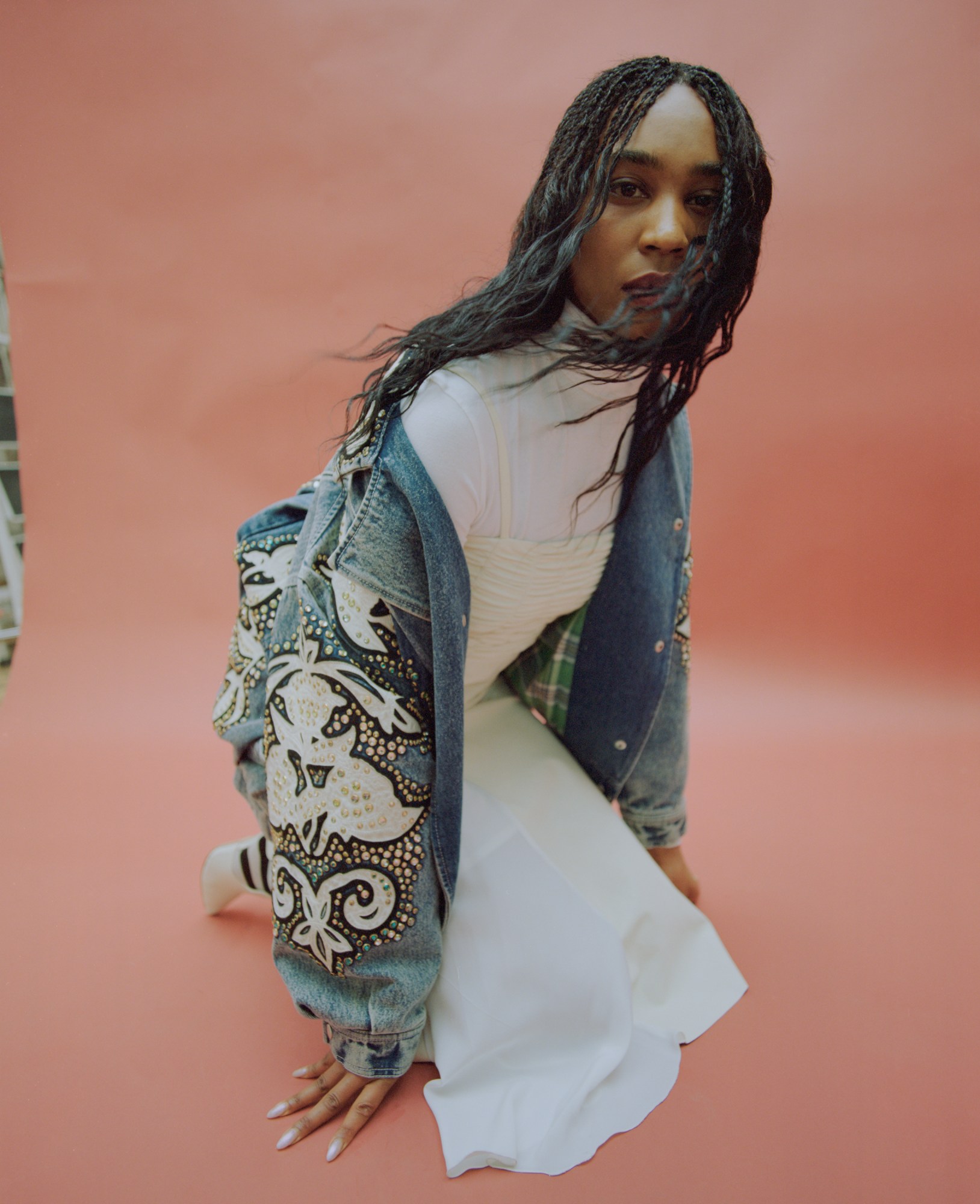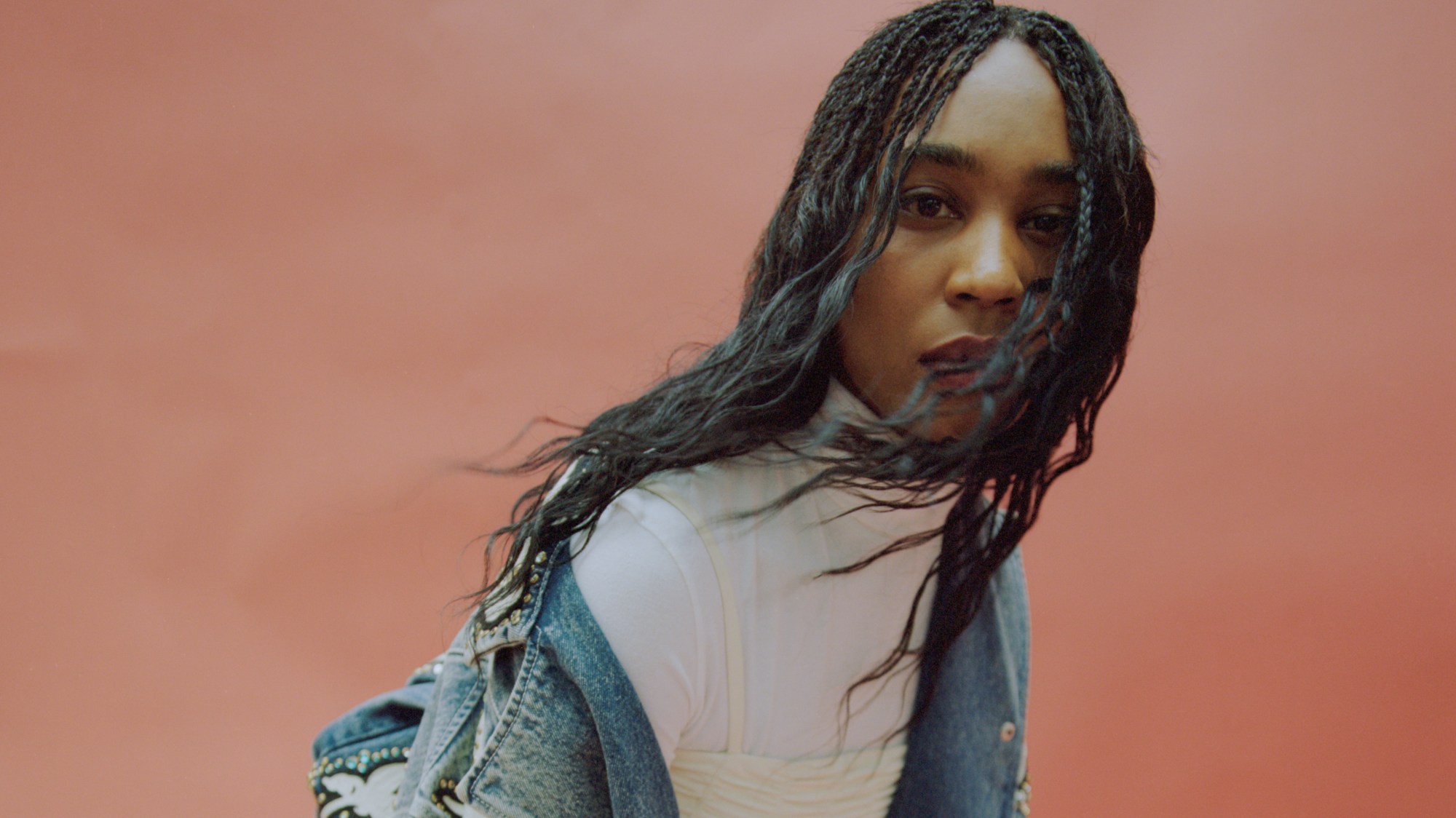This article originally appeared in The Radical Issue, no. 351, Spring 2018.
Multidisciplinary artist Nkisi — born Melika Ngombe Kolongo — grew up in Leuven near Brussels, spent time living in the Congo, and has called south London home for the last six years, after finding herself frustrated by the lack of opportunities in small town Belgium. Nkisi is one of those people who is good at everything; she traded in photography and visual art for music before later settling on a combination of all of them. Nkisi co-founded the NON Worldwide collective, started a monthly late night NTS show mixing African club beats with uncompromising gabber, curates festivals, gives talks and lectures, and has released several EPs of sinister and relentless industrial techno. “It’s nice to be able to move around in different disciplines,” the soft but surely spoken artist begins. “I’m always really interested in the exchange that can happen just outside of language.”
NON Worldwide is a collective, record label and virtual utopia; a safe space with no borders, passports or segregation. Nkisi founded the project with international friends Angel-Ho (South Africa) and Chino Amobi (USA), who she discovered at a warehouse party and later bonded with online before eventually meeting IRL at Club Paradiso in Paris. Their website defines NON as “a collective of African artists, and of the diaspora, using sound as their primary media, to articulate the visible and the invisible structures that create binaries in society, and in turn distribute power.”
“What’s beautiful in our dynamic,” Nkisi explains, “is that we’re all different but glued together by our vision of the change we want to see in the world.” Through releasing music by artists they believe in, producing quarterly publications, and putting on nights, they have successfully built up a cult following, members of which have been known to board flights in order to join them and party.
“I guess I’m very attracted to the idea of darkness and lightness, and playing with those moods.”
“NON as a prefix is about not actually wanting what has been refused to us,” Nkisi says. “That’s something that I live by and want to continue spreading through my works and my curations. For me, that’s my mission statement; how I move in my music, and even down to the practicalities of how I make it, how I blend worlds that are not supposed to be blended.” 2017 saw them collaborate on an event series at the ICA called NON Xchange. The project confronted the legacy of colonialism through performance and discussion designed to challenge systemic exclusion. Highlights included a film by Grace Wales Bonner, Dev Hynes and Harley Weir about a 17-year-old ballet dancer from Pretoria; a talk by queer Johannesburg performance artists FAKA; and artist Juliana Huxtable speaking on disrupting power.
Nkisi’s own NON-released music — dark, stressful, sci-fi techno adventures laced in static — culminated in last year’s EP of ambient electronica, Ruin. “I make dance music because I really enjoy the kind of power that dance music has to communicate through the movement of the body and the exchange of energy,” she says. “I’m obsessed with rhythm.” Her sets are typically made up of a wild mixture of African club beats, movie samples, techno and aggressive helpings of gabber. Her mixes are fast, furious and totally unrelenting, inspired by music linked to her heritage, like the Congolese rumba, and sounds hailing from the Ivory Coast like DJ Arafat — she’s also a big fan of the intense and obscure techno subgenre, doomcore. “I guess I’m very attracted to the idea of darkness and lightness, and playing with those moods.”
Leuven might not have had a lot to offer in terms of creative prospects, but what it did have, it turns out, was a lot of great gabber nights — events that impressed and left a lasting impression on a then teenage Nkisi. “It felt like I wasn’t supposed to be listening to this music. I went to these parties with the perception that it would be very homogenous, but the crowds always ended up being much more diverse than I thought.” She loved the music and wanted to be more involved in it from the start, though her venture into music production would come around later.
“I’ve always been interested in the idea of having this democratisation of creation, that even with minimal resources you’re still able to create.”
New to London, her computer broke and she had to buy a sub-par replacement unable to handle Photoshop or other graphic design tools, so satisfied her creative needs by downloading AudioTool and teaching herself how to make music. “I’ve always been interested in the idea of having this democratisation of creation, that even with minimal resources you’re still able to create. I guess that’s one of the beauties of the Internet. It made it possible for me to be where I am right now.”
Nkisi’s aforementioned obsession with rhythm prompted the research she’s forever doing into the exchange of knowledge and sound as communication; delving into the idea of rhythmic archetypes and how we interact with them, as well as different cosmologies and ancient Bantu teachings. “They had these ideas,” she explains, “about energies and vibrations and what’s possible with rhythm. Probably the core of all my different projects — musical and visual — is about the possibility of seeing the universe differently, seeing what it is to be human.” Live, she works with a drum machine, a polyphonic synth, effects pedals and CDJs. One of her most recent live performances, titled The Dark Orchestra, was presented as an immersive audio-visual performance, inviting audiences into a dream state. “I don’t want the live project to be something fixed, it’s more the ongoing process of trying to explore other views through music; to also take those teachings that are archived all over the world and make them visible. I think this is really important at the moment, to think about new ways to see ourselves both as individuals and as a people.”
As if she didn’t already have enough going on, Nkisi is currently doing an MA course called Culture, Diaspora, Ethnicity, and she just finished an essay that seemed like it would never end, so she’s heading out into the rest of today on a high. “This year we started a module on different ways of researching our dissertation subject,” she tells us. “I basically destroyed the whole concept of knowledge, which was nice to do.” As she plans forthcoming collaborations with artist Paul Maheke and choreographer Ligia Lewis, and plots the release of another EP, she aims to provoke change with what she shares with the world in 2018. “In music you can exchange so much, and it’s outside of language — you can actually feel and embody it.” She pauses, thinking for a moment. “Basically, as my friend always says… music is sick.”

Credits
Photography Nadine Ijewere
Styling Nicco Torelli
Hair Hirokazu Endo using Bumble and Bumble. Make-up Amy Conley at Stella Creative using Chanel Rouge Coco Lip Blush. Photography assistance James Gilbert. Styling assistance Pensira Kira Nakan. Production Roberta Arcidiacono.
